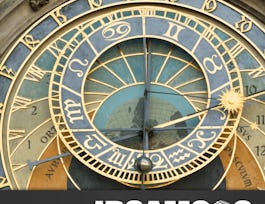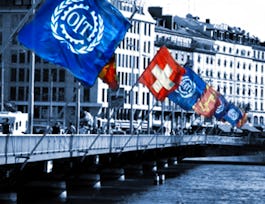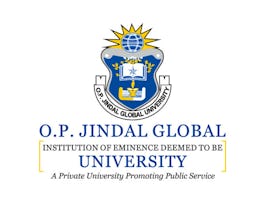The course offers a well-researched and broad-ranging primer to the United Nations system. Consisting of an introduction to the complex UN family and its history, and a series of ‘snapshots’ of key UN functions, which are used to explore important UN themes and help learners develop important analysis, communication, and policy-based skills.


Global Diplomacy: the United Nations in the World
Taught in English
Some content may not be translated
81,429 already enrolled
Course
Gain insight into a topic and learn the fundamentals

Instructor: Dr Dan Plesch, SOAS University of London
(1,537 reviews)
Details to know

Add to your LinkedIn profile
See how employees at top companies are mastering in-demand skills


Earn a career certificate
Add this credential to your LinkedIn profile, resume, or CV
Share it on social media and in your performance review

There are 7 modules in this course
An overview of the MOOC
What's included
1 video3 readings
This week will introduce the idea of the United Nations as a system of more-or-less connected agencies that exist to address a wide range of world problems, and provide an overview of how different parts fit together to constitute the modern United Nations system.
What's included
2 videos1 reading1 peer review
This week will provide an overview of the historical circumstances of the beginning of the UN – what early UN agencies were, what were the influential powers and groups at the early negotiations, and what values the UN was founded on, with comparisons to modern-day approaches.
What's included
2 videos1 reading1 peer review
This week will use the UN Security Council as a primer to the issue of relative power in international institutions. After examining the structure and operations of the Council, it will encourage students to examine the fundamental issues that determine its existence, including the status of the five permanent members, its ability to carry out its function, and the prospects for reform.
What's included
2 videos1 reading1 peer review
This week will address the question of human rights at the UN, introducing the basic documents and declarations that underpin much UN activity. It will introduce the wide range of UN declarations on this topic, how they came about, and then examine potential criticisms of modern UN conceptions of human rights- highlighting revolutionary work on the origins and practice of human rights from our research groups. The non-Western origins of sex equality in the UN Charter and the Universal Declaration of HR changed the understanding of women’s rights to one where they are created by women from the South. In parallel, the war crimes narrative focused on the Nazi leadership is transformed by understanding that there was a UN body including China and India that resulted in convictions of thousands of Nazis and Japanese war criminals. This work features in an HBO Documentary, a Ted Talk on the UN women issue and Netflix and Amazon/Ch4 documentaries featuring the war crimes research.
What's included
2 videos1 reading1 peer review
This week will introduce the family of UN agencies involved in humanitarian work, and begin to unpack their relationships with each other and role in responding to conflict.
What's included
2 videos1 reading1 peer review
In this week, students will have a chance to review and draw together what they have learned over the previous weeks, and develop analysis skills when assessing how different priorities. This exercise will also introduce the issue of practicality and organisational politics to it, giving students an opportunity to consider how the issues they have examined might be affected by the process of implementation.
What's included
2 videos1 reading1 peer review
Instructor

Recommended if you're interested in Governance and Society

University of London

Università di Napoli Federico II

University of Geneva

O.P. Jindal Global University
Why people choose Coursera for their career




Learner reviews
Showing 3 of 1537
1,537 reviews
- 5 stars
77.45%
- 4 stars
17.67%
- 3 stars
3.57%
- 2 stars
0.97%
- 1 star
0.32%

Open new doors with Coursera Plus
Unlimited access to 7,000+ world-class courses, hands-on projects, and job-ready certificate programs - all included in your subscription
Advance your career with an online degree
Earn a degree from world-class universities - 100% online
Join over 3,400 global companies that choose Coursera for Business
Upskill your employees to excel in the digital economy
Frequently asked questions
Access to lectures and assignments depends on your type of enrollment. If you take a course in audit mode, you will be able to see most course materials for free. To access graded assignments and to earn a Certificate, you will need to purchase the Certificate experience, during or after your audit. If you don't see the audit option:
The course may not offer an audit option. You can try a Free Trial instead, or apply for Financial Aid.
The course may offer 'Full Course, No Certificate' instead. This option lets you see all course materials, submit required assessments, and get a final grade. This also means that you will not be able to purchase a Certificate experience.
When you purchase a Certificate you get access to all course materials, including graded assignments. Upon completing the course, your electronic Certificate will be added to your Accomplishments page - from there, you can print your Certificate or add it to your LinkedIn profile. If you only want to read and view the course content, you can audit the course for free.
You will be eligible for a full refund until two weeks after your payment date, or (for courses that have just launched) until two weeks after the first session of the course begins, whichever is later. You cannot receive a refund once you’ve earned a Course Certificate, even if you complete the course within the two-week refund period. See our full refund policy.




